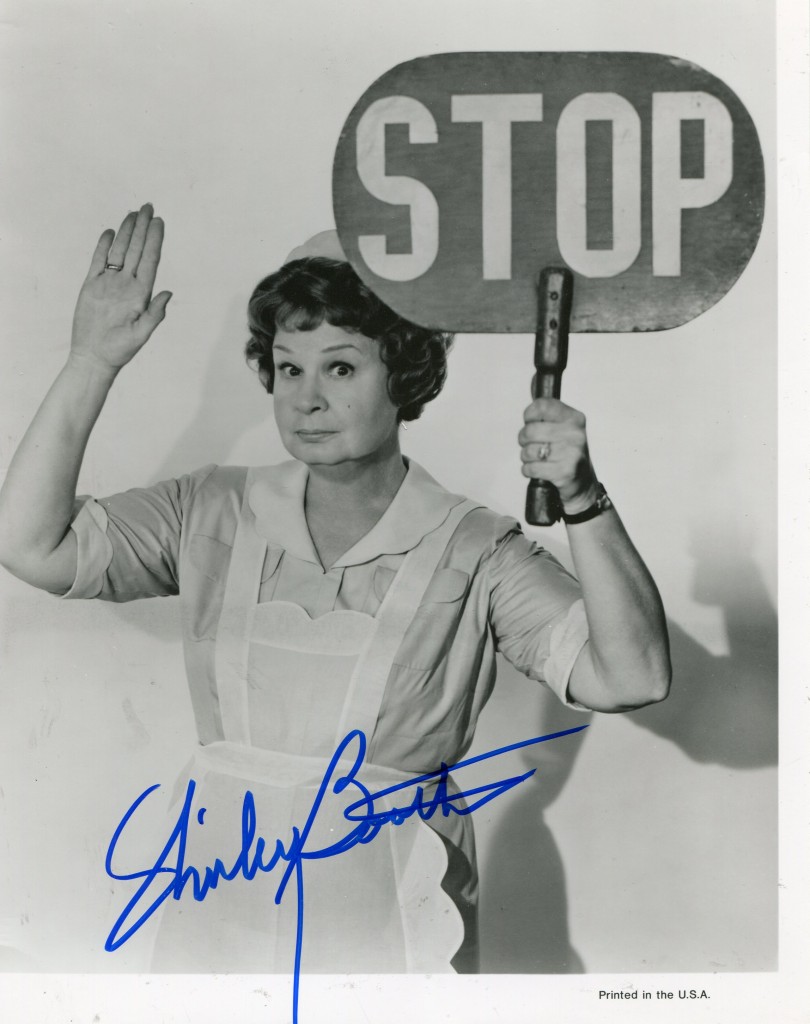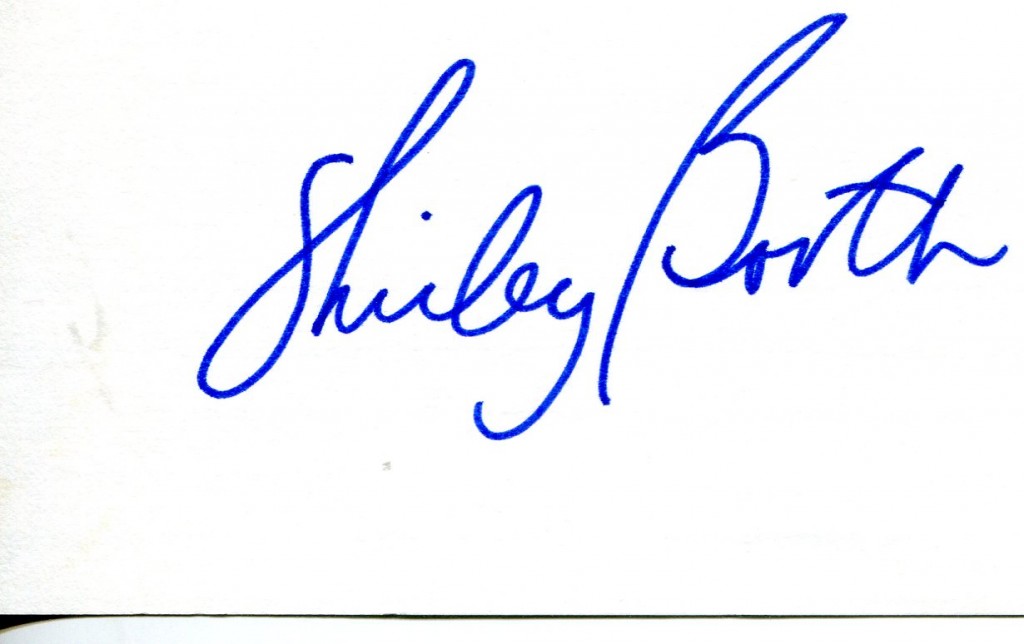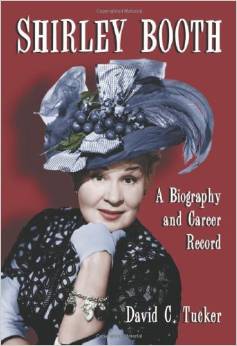
David Shipman’s 1992 “Independent” obituary:
SHIRLEY BOOTH was a magnificent actress with a broad range but she was still unknown in Britain when the film of Come Back Little Sheba appeared in 1953. She had been acting on Broadway since 1925 – and with some success when she played Mabel in Three Men on a Horse 10 years later. Among her later roles were the journalists in The Philadelphia Story (1939) and My Sister Eileen (1940) – played on screen respectively by Ruth Hussey and Rosalind Russell. Booth was a less glamorous version than either, but she was regarded as a sleek career-woman with a nifty line in wisecracks. She used her skill at these in a popular radio show, Duffy’s Tavern, which starred her then husband, Ed Gardner.
As Miss Duffy, she presented a homely image – and that was something she was obliged to take on again in Come Back Little Sheba, on Broadway in 1950. The author, William Inge, was sub- Tennessee-Williams, complete to the poetic titles, and this is certainly his best play. Lola, as played by Booth, shuffled about in a dressing-gown, forgetful and fantasising (about Sheba, the dog of the title), enjoying radio soap operas, spying on the young lovers in the parlour and hoping against hope that her husband has abandoned alcohol without understanding what drew him towards it in the first place – a woman blowsy, good-natured and shabby.
Sidney Blackmer played the dipsomaniac husband, but when the producer Hal Wallis decided to film the play he replaced him, as box-office insurance, with Burt Lancaster. Wallis turned down Bette Davis’s request to play the wife, and cast Booth over Paramount’s objections because, in his own words, ‘she was a great actress’. Britain’s best critic, Richard Winnington, wrote: ‘Miss Booth is a magnificent actress of patently wide range, who accomplishes the miracle of making Lola at once repulsive and beneath her load of pain, longing and stupidity, oddly beautiful.’
Among the other actresses nominated for an Oscar that year were Davis, Joan Crawford and Susan Hayward – whom we may regard as traditional Hollywood actresses when we see that the critic of the New York Herald Tribune wrote that Booth had ‘an acting style like the best modern French and Italian motion pictures’. Booth’s Oscar for Best Actress was an enormously popular one and the film was very successful.
In the meantime she had played Aunt Cissy (the role Joan Blondell took in the movie) in the musical version of A Tree Grows in Brooklyn (1951), with a couple of comic songs, including a hymn to her slob of a husband, ‘He Had Refinement’. Another musical, By the Beautiful Sea (1954), was written especially for her, and she glowed in it. After 30 years in the business she had become one of New York’s most beloved actresses.
Before that, she had had a stunning success in Arthur Laurents’s romantic comedy The Time of the Cuckoo (1952), as a spinster schoolteacher who has her first, and possibly last, affair with an eye-to-the-main-chance Lothario while on holiday in Venice. William Marchant also wrote Desk Set (1955) for Booth, but in both cases the screen versions were offered to Katharine Hepburn (The Time of the Cuckoo became Summer Madness or Summertime on film). Since Hepburn and Booth had been friends since they had appeared on Broadway in The Philadelphia Story, Hepburn asked whether she minded that she took over the roles – but not only did Booth not mind, she gave Hepburn some tips on how the roles should be played.
Wallis had been looking for a screen role for Booth, to follow her Oscar, and he came up with a Back Street-type story, About Mr Leslie, in which she was a night- club singer sharing the life of Robert Ryan for just a couple of weeks every year. It was not a success – which was why Wallis dropped his plan to film The Time of the Cuckoo. He tried twice more with Booth, in 1958. Hot Spell found her as Anthony Quinn’s put-upon wife, and despite too many echoes of other family dramas of the time – including those of Inge and Williams – it worked beautifully because of Booth’s warm performance. Her three films had been directed by Daniel Mann, but Wallis handed her over to Joseph Anthony when he produced Thornton Wilder’s comedy The Matchmaker. In the title-role Booth was much funnier than Ruth Gordon had been on the stage (both in London and New York), and she was probably better than the many stars who played the role when it was musicalised as Hello Dolly].
But once again the public was not very interested, and Paramount’s executives, who had not seen movie-star potential in Booth in the first place, did not encourage Wallis to continue with movie plans for her. She agreed with Paramount; Robert Ryan observed that she was ‘uncomfortable working in the movies. She is a very timid woman and walked part of the way to work before someone told her she could park her car on the Paramount lot. In fact, I told her.’
She turned down other movie roles, including A Pocketful of Miracles and Airport, but continued working on the stage until the Seventies, in, among other plays, Juno and the Paycock and Hay Fever. But she was happiest with a television sitcom, Hazel, based on the Saturday Evening Post cartoon about an obstreperous and none- too-efficient household maid. It began in 1961, and ran for several years, bringing Booth another clutch of awards. During her life it was assumed that Booth was born in 1905, but her family has announced that she was 94 years old at the time of her death.
For myself, I cherish her four screen appearances. I remember vividly her playing Amanda – the mother – in a television version of The Glass Menagerie in 1967. I’m told that she was miscast, but as far as I’m concerned it didn’t matter.
As the New York Post said when reviewing A Tree Grows in Brooklyn, Shirley Booth was ‘one of the wonders of the American stage; a superb actress, a magnificent comedienne and all-round performer of seemingly endless variety.’
The above “Independent” obituary can also be accessed online here.




